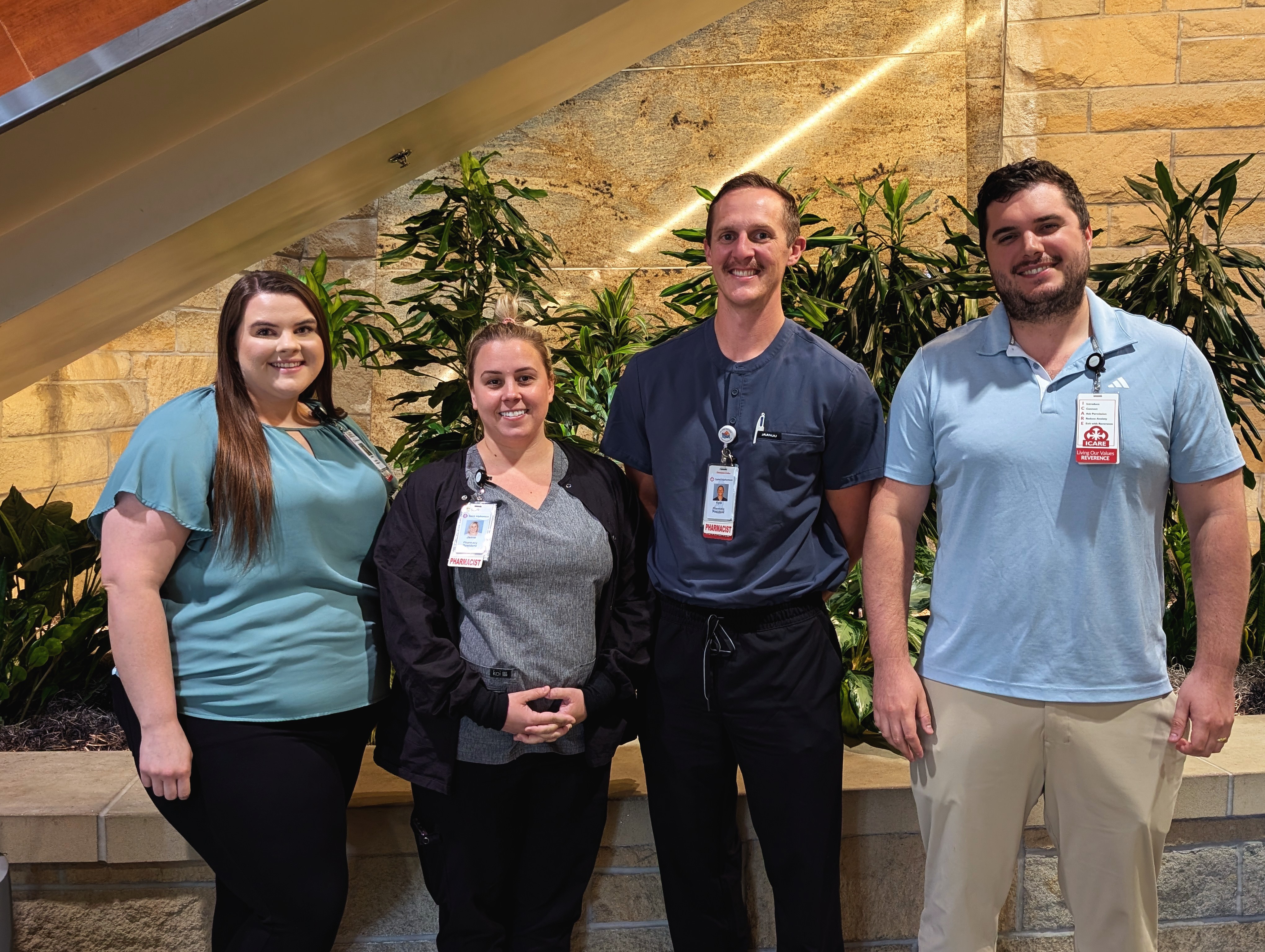Pharmacy Residency - Post-Graduate Year 1 Residency

PGY1 Program Purpose
PGY1 pharmacy residency programs build on Doctor of Pharmacy (Pharm.D.) education and outcomes to contribute to the development of clinical pharmacists responsible for medication-related care of patients with a wide range of conditions, eligible for board certification, and eligible for PGY2 pharmacy residency training. The PGY1 Residency Program at Saint Alphonsus strives to provide residents with the education and skills necessary to effectively deliver pharmaceutical care in various patient environments. Throughout the program, the residents will be provided with opportunities to excel and share their knowledge with other members of the staff, patients, healthcare professionals and the public. This will be seen through effective education on the monitoring, delivery, safety, and appropriate use of medications. Upon completion of the residency program, the residents have the skills to maintain an important role on the healthcare team and are well-equipped to meet the challenges facing today's hospital pharmacists. Through our program, they will develop a high-level of professionalism and compassion for patients consistent with the Saint Alphonsus ministry to heal the body, mind, and spirit.
At Saint Alphonsus Regional Medical Center, we are dedicated to delivering advanced medical services in a spiritual and healing environment. Serving southwest Idaho, eastern Oregon and northern Nevada, our innovative technologies and compassionate staff allow us to provide patient-focused care.
We are a 381-licensed bed hospital and home to the only verified Level II Trauma Center in the region. We are dedicated to providing the highest quality, most optimal care for all critically ill and injured patients. This distinction ensures we maintain the highest standards for chest pain, stroke, orthopedic and general surgery and emergency care. It also creates a foundation of medical excellence, innovation, and collaboration that makes the overall care of our patients receive – throughout the region – that much better.
Important Documents
- $57,600 Stipend
- Paid Time Off: 200 hours, accrued bi-weekly
- ASHP MidYear Clinical Meeting
- State Conference (Idaho Society of Health-System Pharmacy)
- Mountain States Residency Conference
Required Block Rotations
A required rotation where the residents will cover patients on the medical/inpatient oncology area. The pharmacist functions as part of a multidisciplinary team with routine responsibilities including daily review of medication profiles, addressing formal consults, patient education, reconciliation of home medications, and improving medication dosing and utilization in all patients.
A required rotation where the residents will cover patients on the Intensive Care Unit (ICU). This ICU’s patient population primarily consists of medical, neuro, and trauma patients. As part of a multidisciplinary team, the pharmacist is primarily responsible for ensuring safe and effective medication use for all patients admitted to the unit and participates in multidisciplinary rounds daily.
A required rotation where the resident takes an independent role in ensuring safe and effective medication use for all patients admitted to the Family Medicine Residency service. The resident will work closely with medical residents, including participation in interdisciplinary rounds and providing drug information and education.
A required rotation that will give the resident a broad overview of pharmacy operations and management techniques. The resident will work with pharmacy department management, attending and participating in several local, regional, and national committees and meetings. Discussions on organizational management, performance improvement, patient safety initiatives, and financial and operational focuses will occur.
A rotation designed to provide the resident education on the principles of antimicrobial stewardship, resources for infectious disease treatment, and application of both the principles and resources in a given patient population. This will include optimization of antimicrobial use at the health system level, tracking and reporting of such use, analysis of resistance patterns, and education to health care professionals.
Elective Block Rotations
An elective rotation where the resident takes an independent role in ensuring safe and effective medication use for a focused patient population in the critical care setting. The resident will independently function as the pharmacist in the Neurocritical, surgical and trauma (NeST) ICU and work closely with the health care team, including participation in interdisciplinary rounds, and providing drug information and education. They will also independently cover an evening critical care time frame and work with the evening ED pharmacist during those hours.
An elective rotation where the residents will see patients in the outpatient Geriatrics and Palliative Care specialty clinics. The pharmacist works with a multidisciplinary team, including a physician, a nurse practitioner, and a social worker, in an effort to optimize healthcare for the patients referred to the clinic.
An elective rotation where the residents will cover patients in the emergency department. Routine responsibilities include attendance at all high acuity patient events (stroke, sepsis, STEMI, trauma, code critical, and code blue), addressing informal/formal consults, patient education, reconciliation of home medications, and improving medication dosing and utilization in all patients.
An elective rotation where the residents are responsible for the care of the NICU, pediatric and Family Maternity patients which include labor, post-partum and ante-partum patients. The residents primary responsibility is for ensuring safe and effective medication use for all patients admitted to these areas and will round as part of a multidisciplinary team.
An elective rotation where the residents will cover patients in the Cancer Treatment Center. Modalities include medical oncology, radiation oncology, surgical oncology and gynecological oncology in both the outpatient and inpatient setting. The resident will be involved in order entry, handling and disposal of cytotoxic medications, patient education, therapeutic decision-making, and verification of dosing in the delivery of chemotherapy.
An elective rotation where the residents learn about medication usage in various procedural areas including Main OR, Day Surgery, Cath Lab and the Cardiovascular Operating Room (CVOR). Patients will be followed through various phases of care during their surgical encounter and residents will work with various perioperative (SPAR, PACU, etc) and intraoperative teams (surgery team, anesthesia, etc). The OR pharmacist ensures safe medication use and coordinates medication delivery for patients in the main OR and day surgery during all perioperative phases of care. The cardiology pharmacist similarly ensures safe medication use and coordination of medication delivery for procedures completed in the Cath Labs and CVOR.
Longitudinal
A rotation designed to facilitate the completion of original research. The research involves design, IRB submission and approval, data collection and analysis, presentation of data, development of a written manuscript.
A rotation to provide residents the opportunity to gain teaching and education skills through a variety of opportunities including didactic and professional lecturing as well as a formal teaching certificate through Idaho State University.
A rotation designed for the residents to provide both centralized and decentralized patient care duties, including, but not limited to, order and product verification, ensuring and implementing safe sterile compounding practices, and drug therapy monitoring.
- Pharmacist Time and Cost Analysis of Linezolid vs. Vancomycin for Pneumonia at a Community Health System (2024)
- Impact and Management Patterns of Coagulase-Negative Staphylococcus Bloodstream Infections within a Community Health System (2024)
- Evaluating the need for a Cardio-Oncology Clinical Pharmacist (2024)
- Evaluation of the Safety and Efficacy of the Two Bag Diabetic Ketoacidosis Treatment Protocol in Adult Patients (2024)
- Evaluation of Outpatient Antimicrobial Stewardship in Uncomplicated Urinary Tract Infection Treatment (2023)
- Impact of an Integrated Perioperative Pharmacist Service on Medication Management at a Community Teaching Hospital (2023)
- Evaluation of Phenobarbital Dosing Strategies in Patients Admitted to the Hospital for Management of Alcohol Withdrawal Syndrome (2023)
- Assessment of Naloxone Co-prescription Patterns Upon Discharge in a Community Health System (2023)
- Assessment of Perioperative Vancomycin Use for Surgical Prophylaxis in a Community Health System (2022)
- Retrospective Evaluation of the Implementation of a Multimodal Pain Management Protocol at a Level II Trauma Center (2022)
- Application deadline: January 3rd
- Application materials: Letter of intent, Curriculum vitae, 3 letters of recommendation, official college transcripts
- All materials are submitted via PhORCAS
- Interviews: Virtual interviews Late January/February
- Email the program contacts directly for specific information
- International Student Candidates: International students on an F1 visa who have 12 months of employment eligibility available on an OPT, post-graduation from the PharmD program, are encouraged to apply.
Virtual Open House Information
- Trinity Health Virtual Open House Oct 29th from 4:00 – 6:00 p.m. MST
- SNPhA ACCP Virtual Open House Nov 12th from 4:00 – 5:00 p.m. MST
Residency Program Director Arielle Arnold, PharmD, BCPS
Email Arielle
Pharmacy Director Dawn Berheim, PharmD,
Email Dawn
Pharmacy Operations Manager Chris Oswald, PharmD, BCPS, BCCCP
Email Chris
- Current Residents

PGY1 Pharmacy Residents: (left to right) Lauren, Jamie, Kyle, Garrett
